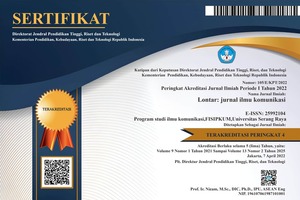Digital Discourses on Medical Tourism: How Indonesians Consider Visiting Penang for Healthcare – A Netnographic Study on Twitter
DOI:
https://doi.org/10.30656/lontar.v13.i1.10496Keywords:
medical tourism, penang, health communication, netnography, platform XAbstract
The phenomenon of medical tourism from Indonesia to Penang, Malaysia, has continued to show a significant upward trend in recent years. In today's digital era, social media platforms such as X (formerly Twitter) have become active public discussion arenas, places where netizens share experiences, provide recommendations, and even consider decisions to undergo treatment abroad. This study aims to explore how digital narratives related to the practice of seeking medical treatment in Penang are formed, spread, and negotiated by Indonesians on the X platform. Using a netnography approach, this study analyzes tweets containing keywords related to treatment in Penang, revealing the dynamics of conversations in various discussions in the digital space. The results of the analysis identified four main themes that dominated the conversation: (1) ease of access and convenience of services; (2) exchange of information and recommendations between users; (3) crisis of trust in domestic health services; and (4) considerations of price, quality, and added value offered by services in Penang. These findings indicate that the decision to seek medical treatment abroad is not only influenced by medical needs or individual preferences, but also by social constructions formed in the digital space. Social media plays an important role as an e-WOM (electronic word of mouth) channel that shapes public perception and preferences for cross-country health services. This research is expected to contribute to the development of health communication and digital culture studies, as well as being a basis for thinking about managing information and health service reputation more strategically in the era of social media.
References
Ajzen, I. (2005). Attitudes, Personality, and Behavior (2nd Ed.). Berkshire: England.
Armstrong, K., Rose, A., Peters, N., Long, J. A., McMurphy, S., & Shea, J. A. (2006). Distrust of the health care system and self-reported health in the United States. Journal of General Internal Medicine, 21(4), 292–297. https://doi.org/10.1111/j.1525-1497.2006.00396.x
Asa, G. A., Fauk, N. K., McLean, C., & Ward, P. R. (2024). Medical tourism among Indonesians: a scoping review. BMC Health Services Research. https://doi.org/10.1186/s12913-023-10528-1
Connell, J. (2013). Contemporary medical tourism: Conceptualisation, culture and commodification. Tourism Management, 34, 1–13. https://doi.org/10.1016/j.tourman.2012.05.009
Cialdini, R. B. (2001). Influence: Science and practice (4th ed.). Allyn & Bacon.
Damayanti, T., Dida, S., Hidayat, D. R., & Cho, S. K. (n.d.). Malaysian Medical Tourism Communication in Shaping Indonesian Public Opinion. https://doi.org/10.24198/jkk.v9i2.35852
Ginossar, T. (2022). Mixed Methods. The International Encyclopedia of Health Communication. https://doi.org/10.1002/9781119678816.iehc0691
Hennig-Thurau, T., Gwinner, K. P., Walsh, G., & Gremler, D. D. (2004). Electronic Word-of-Mouth via Consumer-Opinion Platforms: What Motivates Consumers to Articulate Themselves on the Internet? Journal of Interactive Marketing, 18(1), 38–52. . https://doi.org/10.1002/dir.10073
Jamin, A., Rahmafitria, F., & Nurazizah, G. R. (2020). Rebuilding Health Tourism Destination Image After Covid-19: The Case Of Malaysia And Indonesia. https://doi.org/10.1109/R10-HTC49770.2020.9357057
Kozinets, R. V. (2010). Netnography: Doing ethnographic research online. SAGE Publications.
Lunt, N., Horsfall, D. G., & Hanefeld, J. (2016). Medical tourism: A snapshot of evidence on treatment abroad. Maturitas, 88, 37-44. https://doi.org/ https://doi.org/10.1016/j.maturitas.2016.03.001
Musa, I., et al. (2012). A systematic review of healthcare applications for smartphones. BMC Health Services Research, 12, 1-12. https://doi.org/10.1186/1472-6947-12-67
Nazem, G., & Mohamed, B. (2015). Understanding Medical Tourists’ Perception of Private Hospital Service Quality in Penang Island. Asian Culture and History. https://doi.org/10.5539/ACH.V8N1P100
Ningrum, F. K., Suthiono, F. N., Prananta, M., & Srihadi, T. F. (2023). Factors Influencing the Intention of Indonesians in Conducting Medical Tourism to Malaysia. https://doi.org/10.58631/ajhs.v2i9.73
Ormond, M., & Sulianti, D. (2017). More than medical tourism: lessons from Indonesia and Malaysia on South–South intra-regional medical travel. Current Issues in Tourism. https://doi.org/10.1080/13683500.2014.937324
Penchansky, R., & Thomas, J. W. (1981). The concept of access: definition and relationship to consumer satisfaction. Medical care, 19(2), 127–140. https://doi.org/10.1097/00005650-198102000-00001
Saragih, H. S., & Jonathan, P. (2019). Views of Indonesian consumer towards medical tourism experience in Malaysia. Journal of Asia Business Studies. https://doi.org/10.1108/JABS-04-2018-0135
Selwendri, S., Raharja, S. J., Hermanto, B., & Tresna, P. W. (2024). Revisit Intention Model of Indonesian Consumers to Malaysia for Medical Tourism: An Extension of Theory Of Planned Behavior. Journal of Ecohumanism. https://doi.org/10.62754/joe.v3i8.5512
Shahabuddin, N. S., Abas, S. A., RANI, Z. M., & Halim, N. A. (2023). Exploring the Nexus between Healthcare Tourism Services and Tourists’ Behavioural Intentions in Penang: A Comprehensive Analysis. E-Academia Journal. https://doi.org/10.24191/e-aj.v12isi.24462
Vashu, D., Masri, R., Cham, T. H., & Cheah, K. S. L. (2021). Destination Image as A Healing Destination Among Medical Tourists: An Exploratory Case Study of Penang, Malaysia. ABAC Journal.
Ye, Q., Law, R., Gu, B., & Chen, W. (2011). The influence of user-generated content on traveler behavior: An empirical investigation on the effects of e-word-of-mouth to hotel online bookings. Computers in Human Behavior, 27(2), 634–639. https://doi.org/10.1016/j.chb.2010.04.014
Yopi Makdori. (2024, April 25). https://asumsi.co/post/91476/jokowi-ungkap-indonesia-rugi-rp180-t-akibat-wni-pilih-berobat-ke-luar-negeri/. Asumsi.Co. https://asumsi.co/post/91476/jokowi-ungkap-indonesia-rugi-rp180-t-akibat-wni-pilih-berobat-ke-luar-negeri/
Zain, N. A. M., Hanafiah, M. H., Asyraff, M. A., Ismail, H., & Zain, W. M. A. W. M. (2023). Exploring medical tourism competitiveness in malaysia, thailand, and singapore: the indonesian tourists’ perspectives. https://doi.org/10.21837/pm.v21i30.1403
Zain, N. A. M., Connell, J., Zahari, M. S. M., & Hanafiah, M. H. (2022). Intra-Regional Medical Tourism Demand in Malaysia: A Qualitative Study of Indonesian Medical Tourists’ Rationale and Preferences. The Malaysian Journal of Medical Science. https://doi.org/10.21315/mjms2022.29.2.13
Downloads
Published
Issue
Section
License
Copyright (c) 2025 LONTAR: Jurnal Ilmu Komunikasi

This work is licensed under a Creative Commons Attribution 4.0 International License.
By submitting an article to the journal, the author(s) agree to transfer the published article's copyright to the journal, which will act as the publisher. This means the journal will have the right to publish the article in various forms, including reprints. The journal will maintain the publishing rights to the published articles.
In line with the license, authors and third parties (readers, researchers, and others) are allowed to share and adapt the material. In addition, the material must be given appropriate credit, provided with a link to the license, and indicated if changes were made. If authors remix, transform, or build upon the material, authors must distribute their contributions under the same license as the original.





